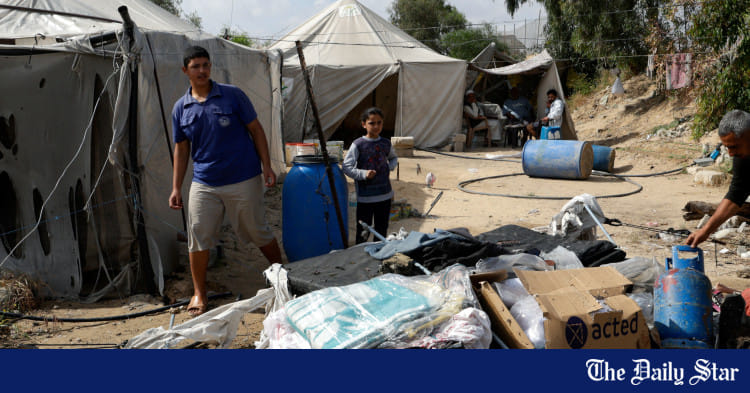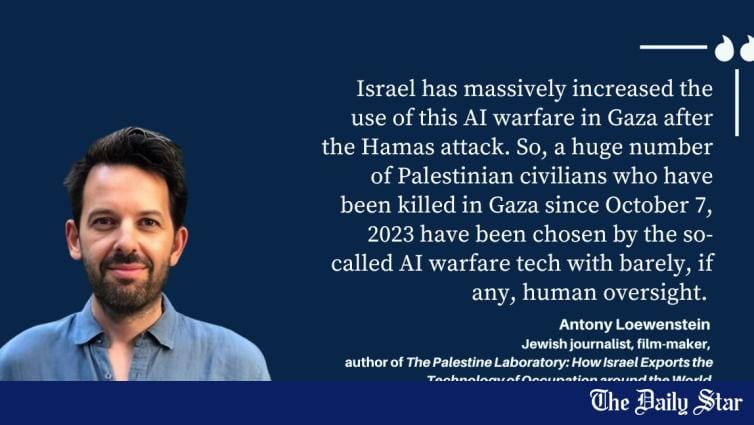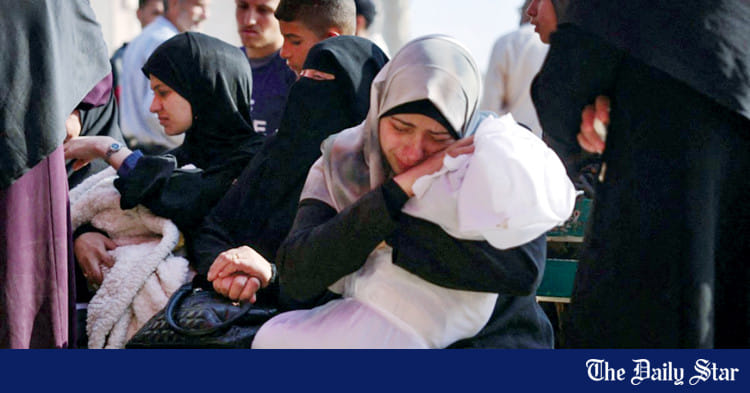Saif
Senior Member
- Joined
- Jan 24, 2024
- Messages
- 17,300
- Likes
- 8,334
- Nation

- Residence

- Axis Group


Israeli strikes kill 36 in Gaza
Gaza rescue teams and medics said Israeli air strikes killed at least 36 people on Thursday, including a family of six whose home was struck in Gaza City...
 www.newagebd.net
www.newagebd.net
Israeli strikes kill 36 in Gaza
Agence France-Presse . Gaza City 24 April, 2025, 23:38

Children queue to receive charity meals from a kitchen in Beit Lahia in the northern Gaza Strip on Thursday. | AFP photo
Gaza rescue teams and medics said Israeli air strikes killed at least 36 people on Thursday, including a family of six whose home was struck in Gaza City.
Israel resumed its military offensive in the Gaza Strip on March 18, following the collapse of a two-month ceasefire that had brought a temporary halt to fighting in the blockaded Palestinian territory.
Six members of one family — a couple and their four children — were killed when an air strike levelled their home in northern Gaza City, the civil defence said in a statement.
Nidal al-Sarafiti, a relative of the family, said the strike came as the family was sleeping.
‘What can I say? The destruction has spared no one,’ he said.
Nine people were killed and several wounded in another strike on a former police station in the Jabalia area of northern Gaza, according to a statement from the Indonesian hospital, where the casualties were brought.
‘The bombing was extremely intense and it shook the entire area,’ said Abdel Qader Sabah, 23, from Jabalia.
‘Everyone started running and screaming, not knowing what to do from the horror and severity of the bombing.’
The Israeli military said it struck a Hamas ‘command and control centre’ in the Jabalia area but did not specify whether the target was the police station.
‘The command and control centre was used by the terrorists to plan and execute terrorist attacks against Israeli civilians and IDF troops,’ it said in a statement.
Elsewhere, 21 people were killed in a series of strikes across the territory, medics and the civil defence agency reported, including several in the southern area of Khan Yunis.
‘We were sitting in peace when the missile fell,’ said Mohammed Faris, who witnessed a strike on the house in Khan Yunis. ‘I just don’t understand what’s happening.’
Bodies lay on the ground, including those of a young woman and a boy in body bags, surrounded by grieving relatives kissing and stroking their faces, AFP footage showed.
‘One by one we are getting martyred, dying in pieces,’ said Rania al-Jumla, who lost her sister in another air strike in Khan Yunis.
‘We have had enough. Every day there’s death, every day we lose someone dear to us.’
Since Israel resumed its military operations, at least 1,978 people have been killed in Gaza, raising the overall death toll to at least 51,355 since the war began, according to the health ministry in the Hamas-run territory.
The war was ignited by the Hamas-led attack on Israel on October 7, 2023, which resulted in the deaths of 1,218 people, mostly civilians, according to an AFP tally based on official Israeli figures.
During the attack, militants also abducted 251 people and took them to Gaza. Of those, 58 remain in captivity, including 34 the military says are dead.
Israeli officials maintain that the on-going military campaign is essential to securing the release of the remaining hostages.
However, many families of the captives, along with thousands of protesters, have strongly criticised the authorities for pressing ahead with the offensive rather than striking a deal.
Agence France-Presse . Gaza City 24 April, 2025, 23:38
Children queue to receive charity meals from a kitchen in Beit Lahia in the northern Gaza Strip on Thursday. | AFP photo
Gaza rescue teams and medics said Israeli air strikes killed at least 36 people on Thursday, including a family of six whose home was struck in Gaza City.
Israel resumed its military offensive in the Gaza Strip on March 18, following the collapse of a two-month ceasefire that had brought a temporary halt to fighting in the blockaded Palestinian territory.
Six members of one family — a couple and their four children — were killed when an air strike levelled their home in northern Gaza City, the civil defence said in a statement.
Nidal al-Sarafiti, a relative of the family, said the strike came as the family was sleeping.
‘What can I say? The destruction has spared no one,’ he said.
Nine people were killed and several wounded in another strike on a former police station in the Jabalia area of northern Gaza, according to a statement from the Indonesian hospital, where the casualties were brought.
‘The bombing was extremely intense and it shook the entire area,’ said Abdel Qader Sabah, 23, from Jabalia.
‘Everyone started running and screaming, not knowing what to do from the horror and severity of the bombing.’
The Israeli military said it struck a Hamas ‘command and control centre’ in the Jabalia area but did not specify whether the target was the police station.
‘The command and control centre was used by the terrorists to plan and execute terrorist attacks against Israeli civilians and IDF troops,’ it said in a statement.
Elsewhere, 21 people were killed in a series of strikes across the territory, medics and the civil defence agency reported, including several in the southern area of Khan Yunis.
‘We were sitting in peace when the missile fell,’ said Mohammed Faris, who witnessed a strike on the house in Khan Yunis. ‘I just don’t understand what’s happening.’
Bodies lay on the ground, including those of a young woman and a boy in body bags, surrounded by grieving relatives kissing and stroking their faces, AFP footage showed.
‘One by one we are getting martyred, dying in pieces,’ said Rania al-Jumla, who lost her sister in another air strike in Khan Yunis.
‘We have had enough. Every day there’s death, every day we lose someone dear to us.’
Since Israel resumed its military operations, at least 1,978 people have been killed in Gaza, raising the overall death toll to at least 51,355 since the war began, according to the health ministry in the Hamas-run territory.
The war was ignited by the Hamas-led attack on Israel on October 7, 2023, which resulted in the deaths of 1,218 people, mostly civilians, according to an AFP tally based on official Israeli figures.
During the attack, militants also abducted 251 people and took them to Gaza. Of those, 58 remain in captivity, including 34 the military says are dead.
Israeli officials maintain that the on-going military campaign is essential to securing the release of the remaining hostages.
However, many families of the captives, along with thousands of protesters, have strongly criticised the authorities for pressing ahead with the offensive rather than striking a deal.








































